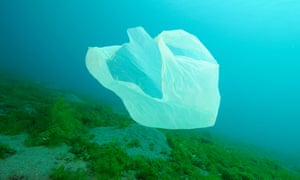Life before plastic / Boing Boing
Margaret Atwood can almost remember such times - and urges us to 'save ourselves from being plasticised to death':
Margaret Atwood: Plastics are poisoning us. We need change, now
In a new series marking the 500th anniversary of the Reformation, the novelist calls for a revolt against petrochemical polymers
Ah, the Reformation. And then, inevitably, the Counter-Reformation. We remember them, sort of, especially after reading Dissolution, CJ Sansom’s detective thriller about the shutting down of and, not incidentally, the looting of rich but decadent English monasteries under Henry VIII and Thomas Cromwell. Or after watching the bloodflow and interfrying of both Catholics and Protestants in various TV series set during various Tudor regimes, most recently Wolf Hall.
Printing the Bible in the vernacular could get you executed. So could attempting to blow up parliament in aid of a Catholic restoration, like Guy Fawkes, which has given us a legacy of those creepy masks sported by members of the online group Anonymous. Then there was Oliver Cromwell, who broke a lot of priceless stained-glass windows in the name of a reformed religion, and made himself so unpopular with monarchists that his corpse was dug up and beheaded.
Then there were the New England Puritans. Yes, their churches were free of plaster saints and the Virgin Mary had been demoted from the queen of heaven to a nice girl who had a baby, but how much fun were the Salem witchcraft trials? (Don’t answer that: some people had quite a lot of fun.)
But now I have been asked the following question: if given the chance, what institution would I myself reform? To which I reply: what institutions do we have that are both in need of reformation and powerful enough to be worth the trouble? And the risk, as once you start reforming, heads may roll. Many candidates spring to mind: international banks, the oil business, big pharma, and so on.
But of them I know little.
So I would choose to reform plastics. Are plastics an institution? Not in the sense of having a pope, or even a small cabal of leaders. But they are surely the modern equivalent of a universal religion. We worship them, whether we admit it or not. Their centre is whatever you happen to be doing, their circumference is everywhere; they’re as essential to our modern lives as the air we breathe, and they’re killing us. They must be stopped.
No, no, put down the torches and pitchforks! Let me explain!
Once upon a time, not so long ago – within my own lifetime, or just before its inception – there was hardly any plastic. There was only Bakelite, used to make decorative dessert-fork handles and chunky art deco jewellery. Cheap toys were made of tin. Garbage was rolled up in newspaper and tied with string, because there were no plastic bin-bags. There were no exercise balls. Rubber gloves were made of rubber.
But then came the marvellous multiplastic world of the 1950s that has been with us ever since. Look around your life: your trash-disposal stratagems, your bottled water containers, your hummus tubs and snap-top salad boxes, your computer keyboard keys, your grocery bags, just for a few obvious examples. Where would you be without plastic? What could take its place?
But all this plastic – or most of it – eventually ends up in the water supply, including the drinking water and the oceans. Eight million tonnes of plastic waste is added to the oceans every year. Because of oestrogen-imitating chemicals leaching from discarded plastics, the fertility of male sperm is plunging, and frogs are developing intersex traits. Worse, microplastic particles are seriously affecting fish fry and phytoplankton. That’s bad news for us, because phytoplankton are the basic building block of oceanic life.
Dead oceans mean dead people – either through famine, or, if the marine algaes that make 60-80% of the oxygen we breathe are also extinguished, through oxygen deficiency.
Thus the absolute need for the Plastics Reformation. What should be done? First, organic and biodegradable substitutes must be found to perform the chores now done by plastics. Moulded and baked fungus, textiles made of milkweed, silicone food storage bags? All exist. Second, we need to invent methods to filter plastics out of seawater, collect them before they ever hit the ocean. Third, we then need to break them down into their component parts, rendering them harmless.
The colourful Mr Trash Wheel, a solar-powered collector in operation in Baltimore, might be a start. The Ocean Cleanup organisation is already working on other plastic-filtering approaches. More recently, plastic-digesting waxworms have been discovered whose enzymes could in theory be synthesised. We may yet save ourselves from being plasticised to death.
If so, would there be a counter-reformation? Will protesters march with signs reading Plastics for Ever and Bring Back Plastic Hula Hoops? Maybe. But once the Plastics Reformation gets going, these Luddites will be no match for Mr Trash Wheel and the Waxworms.
Memorable. Catchy. It sounds like a band. And, very soon, coming to a neighbourhood near you. Let’s hope.
Margaret Atwood: Plastics are poisoning us. We need change, now | Books | The Guardian
.
.
.


No comments:
Post a Comment